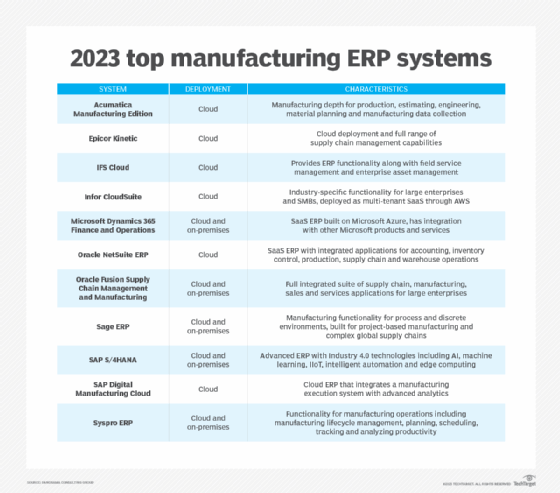Top 10 essential skills for ERP professionals in 2026
Both hard and soft skills are essential for ERP professionals, including project management and being up to date with technology.
As with any software, people are needed to manage it -- and ERP software is no exception.
CIOs and any other C-suite leaders who work with ERP software should ensure that those who hire employees to work with ERP software are checking for some specific skills before bringing new people on board.
ERP systems are complex, as they manage numerous business requirements while also needing integrations with other systems. These complexities require organizations that deploy their own ERP systems to also employ an ERP professional to handle the system. An ERP professional's role typically includes the following tasks:
- Keeping projects on track.
- Implementing and updating the ERP system.
- Driving change management initiatives.
- Aiding budget expectations.
- Educating users.
- Helping shape user experiences.
Successful ERP professionals must possess a varied skill set that demonstrates both the hard and soft skills needed to run and manage an ERP system.
ERP skills
The following 10 hard and soft skills are must-haves for any employee who will be implementing and managing an ERP system.
1. Intuition
Intuition is one trait that can't be trained or taught. Instead, it's either innate, or it takes years of experience in project management to build up. ERP project managers should have the ability to sense how a project is developing and should have an instinct built for detecting issues.
2. Project management
A CIO's company is likely looking for candidates who have been responsible for a project before and have had experience working with a full ERP implementation lifecycle. ERP professionals should have project management skills, including project planning and execution. They should also have skills in managing multiple projects, timelines and budgets.
3. Problem-solving
A company's ERP implementation should go smoothly, and their ERP professional should be able to fix any problems that occur. An ERP professional should be able to identify, analyze, troubleshoot and remedy any technical issues that arise. Past examples of such problem-solving skills can also be useful.
4. Resourcefulness
An ERP professional should be able to pinpoint ERP processes and configurations that can be improved. A level of resourcefulness is needed to create a strategy to make modifications or updates to the ERP implementation that also maximizes return on investments and productivity. A CIO's company is likely looking for resourceful candidates who can solve the organization's problems with the resources they have on hand.
5. Up to date with technology
ERP professionals should have experience in or knowledge of using the proper technologies to implement and manage ERP hardware and software. Skills in ERP technologies can be gained from firsthand experience, training or certification programs. The technologies, technical skills and experiences ERP professionals should possess include the following:
- Artificial intelligence.
- Big data.
- Creating custom reports.
- Data management.
- Data integration.
- Data migration.
- Data modeling.
- Predictive analytics.
- Programming languages such as SQL or XML.
- Robotic process automation.
ERP professionals should also have some familiarity with ERP systems and architectures -- such as those from SAP, Microsoft and Oracle -- as well as any local data standards and regulations.

ERP systems also differ from vendor to vendor, which means the more well-versed a candidate's skills are, the better.
6. Effective communication
Leading an ERP implementation requires good communication skills. ERP professionals should be able to openly discuss projects with their teammates in a clear and concise manner. The ability to communicate clearly -- through spoken or written word -- is an integral part of making a project plan succeed.
Organizations also value the ability to resolve conflicts and disagreements between team members in a calm and reasonable manner.
7. Mentoring
Another valued skill for ERP professionals is the ability to teach skills to other employees. ERP professionals who feel comfortable sharing their knowledge while also being able to learn from their peers strengthen those individuals' skills -- while also strengthening the skills of their team.
An ERP professional providing mentoring and support to those around them also helps keep a project on track by saving time on training and lets organizations retain employees who might lack specific skills.
8. Team building
The ability to bring a team together is a soft skill ERP project managers must possess. ERP professionals should be able to provide feedback to their teams, guide them when needed and give them opportunities to try new things while also knowing what is expected from them.
Teams should be able to come together to collaborate, share knowledge and solve any potential technical issues. It is also important for ERP professionals to develop their conflict resolution skills to prevent any fights or tensions between team members.
9. Flexibility
ERP systems are designed with flexibility and scalability in mind -- with the idea that they can be customized over time to meet the changing needs of an organization. Likewise, ERP professionals should be flexible and adaptable to new changes and unexpected conditions.
The process of implementing an ERP system is typically complex, and there might be problems along the way. The ability for ERP professionals to stay calm and flexible throughout the project is integral. They should stay open to feedback while also being able to make changes to project plans as needed.
10. Organization
There are many parts of an ERP project that need some level of organization -- including the organization of the ERP project plan and the people involved in developing it.
Different aspects of an ERP project that require organization include the following:
- Contracts.
- Documentation.
- Emails.
- Lists of employee tasks.
- Memos.
- Project requirements and specifications.
- Reports.
- Reviews.
- Risks.
Organizations will benefit from an ERP professional's ability to be organized. Time management is also an essential ERP skill, as it's difficult to stay organized without being able to manage time accurately.
Alexander Gillis is a technical writer for the WhatIs team at TechTarget.








